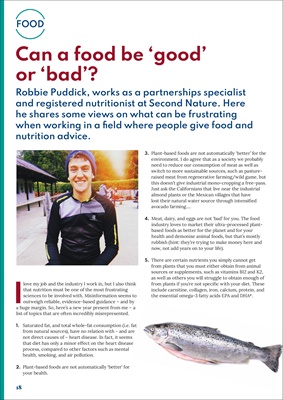
18
FOOD
Can a food be 'good'
or 'bad'?
Robbie Puddick, works as a partnerships specialist
and registered nutritionist at Second Nature. Here
he shares some views on what can be frustrating
when working in a field where people give food and
nutrition advice.
I
love my job and the industry I work in, but I also think
that nutrition must be one of the most frustrating
sciences to be involved with. Misinformation seems to
outweigh reliable, evidence-based guidance - and by
a huge margin. So, here's a new year present from me - a
list of topics that are often incredibly misrepresented.
1. Saturated fat, and total whole-fat consumption (i.e. fat
from natural sources), have no relation with - and are
not direct causes of - heart disease. In fact, it seems
that diet has only a minor effect on the heart disease
process, compared to other factors such as mental
health, smoking, and air pollution.
2. Plant-based foods are not automatically 'better' for
your health.
3. Plant-based foods are not automatically 'better' for the
environment. I do agree that as a society we probably
need to reduce our consumption of meat as well as
switch to more sustainable sources, such as pastureraised
meat from regenerative farming/wild game, but
this doesn't give industrial mono-cropping a free-pass.
Just ask the Californians that live near the industrial
almond plants or the Mexican villages that have
lost their natural water source through intensified
avocado farming….
4. Meat, dairy, and eggs are not 'bad' for you. The food
industry loves to market their ultra-processed plantbased
foods as better for the planet and for your
health and demonise animal foods, but that's mostly
rubbish (hint: they're trying to make money here and
now, not add years on to your life).
5. There are certain nutrients you simply cannot get
from plants that you must either obtain from animal
sources or supplements, such as vitamins B12 and K2,
as well as others you will struggle to obtain enough of
from plants if you're not specific with your diet. These
include carnitine, collagen, iron, calcium, protein, and
the essential omega-3 fatty acids EPA and DHA*.